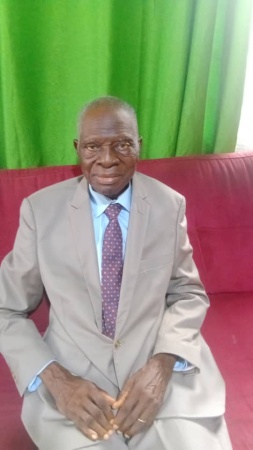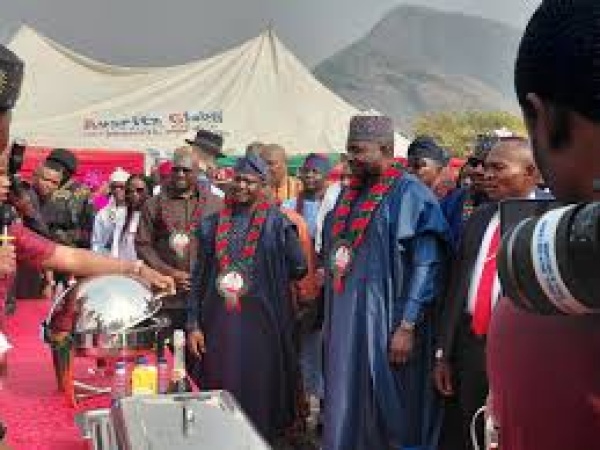

























Loading banners


NEWS EXPRESS is Nigeria’s leading online newspaper. Published by Africa’s international award-winning journalist, Mr. Isaac Umunna, NEWS EXPRESS is Nigeria’s first truly professional online daily newspaper. It is published from Lagos, Nigeria’s economic and media hub, and has a provision for occasional special print editions. Thanks to our vast network of sources and dedicated team of professional journalists and contributors spread across Nigeria and overseas, NEWS EXPRESS has become synonymous with newsbreaks and exclusive stories from around the world.

After decades of grappling with reform of the power sector by successive federal administrations, committing trillions of naira into it with the intention of making electricity available in abundance to Nigerians for both industrial and domestic uses, efficient generation, transmission and supply of electricity to end-users had remained an illusion. As a result, the government decided to privatise the lame-duck National Electric Power Authority (NEPA), later christened Power Holding Company of Nigeria (PHCN). Government had, in taking this decision, cited high level corruption by officials of the power agency - which badly affected its operational efficiency - and hoped that it would be far better managed by private operators, in the interest of Nigerians.
To ensure huge success of this reform of the power sector and its privatisation, a Presidential Action Committee on Power (PACP) chaired by the president, was put in place, with the vice-president and ministers as members, and key roles assigned. Also put in place was a Presidential Task Force on Power (PTFP), chaired by the Special Adviser to the President on Power, with a mandate to ensure a symbiotic relationship between relevant ministries, departments and agencies (MDAs) and the private investors. It also had a specific directive that they take good time to ensure that all risks ahead of the full sector reforms and privatisation were identified and brought up for mitigation or removal.
With no potential risks apparently seen or identified by these committees and task forces of the Federal Government, it had gone ahead to sell this very essential public utility agency to private persons – comprising both the power generation and distribution outfits of government (contrary to the informed advice of a serving minister who was later compelled to resign).
However, and unfortunately, the dreams of both the Federal Government and the Nigerian public - with regard to efficient and adequate supply of electricity for domestic and industrial uses - still remain as far from being realised (if not farther off), as it was, prior to privatisation. And there is no hope that the situation will become better in the near future, except by a kind of revolutionary approach, backed by fervent prayers for God’s miracles.
Nigerian citizens who are seriously in need of sufficient energy for their uses, but have lived in lack of it through decades on end, are still faced with the same recurring ugly scenario of: obsolete and ageing equipment (such as transformers and cables); incessant power outages, due to gross shortage in supply or constant breakdown of these outdated equipment; non availability of pre-payment meters, for honest, accurate utility charges; huge estimated bills - as a result of absence of the pre-paid meters, bulk metering of villages and communities, haranguing them into paying or being disconnected; and, amazingly, the recent upward review in tariff (up to 45 per cent) by the Nigeria Electricity Regulatory Commission (NERC). That is despite the virtually zero services Nigerians are subjected to by the Distribution Companies (Discos), who must have put the NERC under pressure, in an inordinate bid to make profit.
Given the inefficiency of these electricity distribution companies, which has manifested the same old problems to Nigerians so early – even in worse dimensions, it is clear that these private operators who ventured into this gigantic enterprise lack the technical knowhow to support their operations. They do not have the resources (both physical and manpower) with which to transform it into an efficient power supply company that could support the urgently-needed industrial and economic growth. The distribution companies, investigation revealed, are in dire need of sufficient funds with which to procure raw materials, such as the energy itself, from the generating companies (Gencos) and purchase of new equipment such as cables, transformers and pre-paid metres.
The unhealthy consequence of this serious incapacity is the on-going alarming exploitation of electricity consumers in their bid to break even and make profits through crazy, irrational monthly bills (even for energies supplied through transformers provided by communities), and the persistent push for the new tariff regime recently approved by the NERC, without any consideration for the plight of the consumers, who have all these years been compelled to pay for inefficient services by NEPA and its successor . It is utterly unfair and ungodly for the distribution companies to make money off innocent citizens, through illegal means by making people pay for energy not consumed. They accomplish this dubious feat do by failing to provide users with pre-paid metres, and sitting in the comfort of their offices to manufacture bills off-hand which, when resisted, would result to disconnection of consumers.
No government with the interest of the masses at heart should allow this evil to thrive, because electricity consumption billing based on estimation is tantamount to extortion, and any attempt to get the consumers to pay this by force, is a form of intimidation, both of which are criminal offences punishable by the laws of the federation. It’s astonishing, therefore, that the Nigeria Electricity Regulatory Commission set up to protect Nigerians from these evils, appears to be condoning them, invariably colluding with the distribution companies to perpetrate such evils. For instance, there appears to be more to it than meets the eye. In the hurried approval of a new energy tariff for Discos, in the absence of any improvement in power supply, indeed leaves consumers far worse off than ever before.
NERC should also be held liable, even culpable, for allowing the Discos to operate without pre-paid metres made available to consumers, and for putting in place the so-called Credit Advance Payment for Metering Implementation (CAPMI) – a programme fraught with all sorts of clumsiness, which appears to compel consumers to lend the Discos money with which to provide pre-paid metres. This is absurd: multi-billion naira corporate institutions asking poor consumers to lend them money with which to procure energy metres. At a close glance, this is a tacit way of continuing with the exploitative, faceless, inhuman estimated billing method ad infinitum – since most consumers may never easily afford the over N40,000 required to provide one pre-paid metre – an equipment that is usually mounted free for every consumer by the energy company - which remains its property.
Another challenge of the CAPMI programme is that most consumers are tenants living in other people’s houses. So, each landlord is being saddled with the difficult burden of having to get his or her tenants to make such monies available – the immediate constraint here (besides the general inability to afford) being how a tenant who manages to afford the money for the metre, but suddenly has need to leave the house, would recover his/her money, given that the metre he has helped to procure, will ultimately become property of the Disco, which the tenant cannot go away with to his or her new location. It is all these acts of inefficiency and criminality by the electricity distribution operators, apparently supported by a government agency (consciously or unconsciously) that have begun to send serious signals that the privatisation programme of the electricity sector has turned out an effort in futility, since these investors, battled by all forms of incapacitations, want now to reap from where they have not sown, with innocent Nigerians as the beast of burden being milked by the day, a development that should, and must be quickly brought to a stop.
It is glaring that government, with all the action committees, task forces and pre-privatisation strategies particularly charged with identifying risk factors, for mitigation or elimination, eventually failed to guide the government appropriately. It has now become a monumental mistake for government to have believed that PHCN, with its essential services roles in the polity, could be privatised; it has also turned out an erroneous impression and belief on the part of the private business operators, who came angling for it, that the project was worth investing in, for profits, whereas the cost of making the energy services available to citizens is so gigantic that only government could handle with public funds. It is even clear now that even the ordinary responsibility of making pre-paid metres available to consumers, is becoming impossible to the Discos, hence their shameless resort to the clumsy CAPMI plan, requiring the ‘ordinary’ consumers to procure such a basic service tool for them – with all the difficulties involved, including the obvious crisis between landlords and their tenants.
Recommendations
Now that we have realised that the entire process of generation and distribution of energy to the citizenry, should never have been privatised and allowed to be solely in the hands of ill-equipped private operators, with the enormous constraints facing them in providing satisfactory services to Nigerians; now that these investors have no way of going about this, without rather cruelly exploiting the masses, in view of their inclination towards profit-making, and, because indeed, such essential public utility as power (electricity) should be made available to people, sufficiently subsidised by government, it is highly recommended that government should quickly nullify the sale of PHCN and make appropriate refunds to the investors, after the necessary ‘checks and balances.’ Having done that, it should then put its acts together again and go back to the drawing board, on how best to make power generation and supply available to Nigerians, as effective, efficient and abundant as possible, despite the corruption phobia that led the error of privatisation in the first place.
Modalities for the return of PHCN to its status quo ante should quickly be put in place by government, beginning with the selection of credible, God-fearing Nigerians who are highly knowledgeable in the intricacies of the power sector; men who will sit round the table of an entirely new power reform committee of President Muhammadu Buhari and devise new strategies for the eventual success of the power sector. Let us embark on this reversal exercise, relying on the fact that seated at the helm of affairs of the country today, is an anti-corruption President, who is totally committed to making Nigeria a corruption-free nation, and has been so desirous of particularly fixing the power sector, in view of its potentials to lift Nigeria so high, economically and socially. In the proposed attempt at making this sector work, government should, this time around, seriously explore the clean energy sources of wind and solar mix (with minimal attention to hydro and thermal sources), in view of the great advantages in exploiting these sources, in terms of massive availability and safety of use (free from gas emissions/environmental pollutions). In this regard, government can still partner with private operators, particularly those who have researched into, and discovered the technology of mixing wind and solar sources to provide sufficiently abundant electricity for use by Nigerians. Other countries have succeeded in this, and are enjoying the economic advantages. Government should quickly fish out these clean energy mix experts, for the purpose of this partnership.
A public-private partnership (PPP) method with such experts will surely work here, as each party will act as a watch-dog over the other; guided by well- articulated Memorandum of Understanding (MoU). This idea of partnering with energy mix engineers will be a clear departure from the past failed arrangements of ‘government alone’ with corrupt officials, or the ill-equipped ‘private operators alone,’ both of which have left Nigerians suffering for so long, and the Nigerian nation trailing far behind others in development, due to lack of sufficient electricity generation and distribution. Under the new arrangement, Federal Government is expected to review, through the proposed power reform committee, the activities of the Nigeria Electricity Regulatory Commission, to determine whether it will still remain relevant or be scrapped and a more relevant commission put in its place.
A clarion call is hereby made to such stakeholders as: the Nigeria Electricity Consumer Advocacy Network (NECAN), the Manufacturers Association of Nigeria (MAN), the Consumer Protection Council, the Nigerian Labour Congress (NLC), the Nigerian Society of Engineers, the National Assembly (comprising the Senate and House of Representatives) to, as a matter of urgency, take up this matter and prevail on the Buhari administration to quickly consider the obviously inevitable option of nullifying the privatisation of PHCN, with a view to exploring other viable options (including but not limited to the ideas put up in this article) towards the most effective and most efficient provision of electricity to Nigerians, devoid of any form of exploitation. This should be treated as a very urgent matter of high national importance.
While this redemptive action is eagerly awaited by the public, who are presently being strangulated by the embattled electricity distribution companies, the Federal Government should quickly give an order prohibiting them from any further exploitation of consumers, in the form of estimated bills, as well as the imposition of the CAPMI programme with all its confused and exploitative nature, etc.
Government should also seriously call NERC to order and get it to reverse the recent hike in electricity consumption tariff, which is clearly intended to provide the private investors with undue benefits from the pockets of helpless Nigerians. The regulatory body should also be made to closely monitor the reversal to the old rates by the distribution companies country-wide. If they fail, the agency should be held culpable by government for complicity with the Discos.
•Chima Ugwuanyi can be reached at info@diamondreport.com.ng. Photo shows Power Minister Babatunde Fashola.